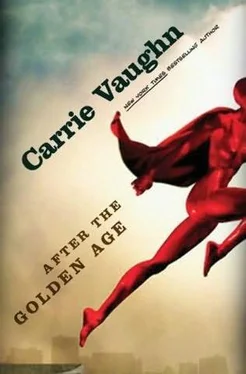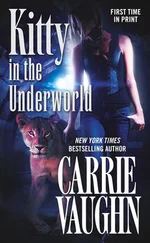Smiling wryly, Suzanne hooked her arm around Celia’s and guided her out to the car.
* * *
The Commerce Eye came out with a special evening edition: “Daughter of the Olympiad Turned Against Her Family!” it read in huge, decadent lettering. In a flash, in a sentence, the last eight years disappeared. Nothing good she’d done in her adult life mattered. How depressing.
After her mother dropped her off at her apartment, it started raining. Sheets of rain beat against the kitchen window. Across the street, the sky was throwing a lovely pink and orange sunset against the windows. But outside her windows, and only her windows, rain.
She opened the window in the living room, popped the screen out of the frame, and leaned out.
“Do you want to come in and talk, or are you just going to keep flinging water at me?” she shouted at the roof.
A moment later, a figure rappelled down the wall. In seconds, Typhoon reached the window and slipped inside. Celia closed the window behind her.
She was in costume, dripping water on the carpet. The rain kept on outside, an echo of the dour mood Typhoon projected with her frown. She pulled off the mask, and it was Analise, glaring at her as if Celia had just kicked her dog.
“Is it true?”
Celia rolled her eyes. “If I were going to lie under oath, do you think it would be about that ? Yes, it’s true.”
Analise’s face puckered, and the bottom dropped from Celia’s stomach. My God—she’s going to cry.
Sure enough, her voice cracked. “How—how could you?”
Why could no one understand this? Couldn’t anyone see the despair she’d felt at the time? The utter hopelessness, the utter failure she’d been at making anything of herself. That was it exactly, in a way Celia had never looked at before—she’d been trying to see just how bad it could really get, when she joined the Destructor.
When she didn’t say anything, Analise continued. “How could you do it? Look at who your parents are: Captain Olympus and Spark! You had that legacy, a birthright that some of us would kill for, and you spat on it!”
“I didn’t have a legacy,” Celia said quietly. “Put yourself in my shoes, Analise. Your parents are the greatest superhumans Commerce City has ever known, but you … you can’t even ride a bicycle straight. You can’t win a swim meet. You can’t fly, or read minds, or tell the future, or pyrokinetically manipulate pasta sauce. And your parents can’t hide their disappointment. Tell me: What do you do then?”
Analise stared back at her, and Celia could tell she didn’t understand, because her expression didn’t change. Didn’t soften. She didn’t look away, or let the tears fall. Instead, her mouth hardened. She’d looked at the poolside kidnappers that way.
“That’s no excuse. Not for siding with the Destructor.”
“Maybe if I’d been able to create tidal waves and make rain fall, it would have been different. I don’t know why I didn’t inherit any of my parents’ powers. I don’t know why I turned out so … so—” Dull. Boring. Badly. “I was a stupid teenager. Please tell me you’re not going to judge me based on that.”
Crossing her arms, a wound-up bundle of nerves, Analise started pacing. Celia wondered if she should get her a towel, so she’d stop soaking the carpet.
Analise said, “What else can I do? I’m seeing you in a whole new light. You have that, that evil in you—”
“Oh please—”
“And you threw it in your parents’ faces!”
“Can we leave them out of it?”
“You don’t understand what they mean to the rest of us. Look, I’m sorry you don’t have any powers. I can’t explain it. Hell, I don’t know why I can do what I can do. I have normal parents, and when I discovered my … my talent, I thought it was the end of the world. I thought I’d get locked away like some lunatic, or turn into a psycho vigilante like Barry Quinn. But there was something else—I wanted to make it something good. Your parents showed me how to do that. They let me think of this, not as something that happened to me, but as something I could use. As a gift. Without them, I don’t know where I’d be.”
“Well, you see where I am with them.”
“You can’t blame your past on them, Celia.”
“Aren’t I the one who said to leave them out of it? How many times do I have to say it: I’ve spent the last eight years trying to make up for one mistake, and the only message I’m getting is, that isn’t possible. Yesterday I was a respectable upstanding citizen, and today, suddenly, I’m dirt. Mark won’t talk to me, the papers brand me a criminal—what the hell happened?”
Analise pursed her lips, looking thoughtful. For a moment Celia thought she was getting through to her, that she wouldn’t lose both her and Mark. Then she said, “How do I know you won’t do something like that again? You don’t get along with your parents any better now than you did then … so how do I not you’re not still like that? That you’re not still working with the Destructor? That you didn’t get put on this case on purpose, that—”
“Analise,” Celia said as calmly as she could. “That’s crazy.”
“Is it?”
Celia realized that nothing she said would help, because no one trusted her. Even Analise, her best friend, suddenly assumed that every word was a lie.
“Yes, it is,” Celia said, for as much good as it would do.
At first Analise hesitated, like she was about to decide that she trusted Celia after all. Then she moved back to the window.
“I need to go think. I’m sorry.” She put her mask on and gripped the dangling rope.
“Analise, don’t you dare run away from me!”
But she was already gone, climbing up the rope, her specially designed gloves gripping despite the wet. A few minutes later, the clouds broke, and the last rays of sunset shone in.
THE Trial of the Century, the newspapers called it. Like the Storm of the Century. They seemed to happen every ten or twenty years. The last Trial of the Century had been when she was a little girl, involving a husband-and-wife bank robber team that specialized in hacking ATM machines. They were noteworthy because they would make out in front of the security cameras. The Kissing Crooks. Bank robbery soft core porn. Celia hadn’t been allowed to watch the trial coverage.
The next day, the front page of the city’s so-called respectable newspaper, the Commerce City Banner , featured her picture, snapped by an intrepid photographer as she left the courtroom. A close-up, framed by bodies in dark suits, mostly people from the DA’s office who all left in a crowd; she was the only one with features visible: brick-red hair, short and tousled, eyes squinting a little in the light, looking ahead, lips pulled in a frown. Her mother should have been nearby, but she’d been cropped out of the image. Artistic license or something.
Her story rated a sidebar, so maybe she hadn’t quite graduated from the position of footnote to the Trial of the Century. She wouldn’t mind staying a footnote. “West Heiress’s Dark Past,” read the headline, with a sub-header, “Who is Celia West?” Lots of unanswered questions peppered that article, since the records were sealed and she wasn’t commenting. Some people, including Bronson, had given quotes vowing that they trusted her, for which she was grateful.
But other quotes—from politicians, gossip columnists, college professors whom she barely remembered—observed how reclusive she was, that she was estranged from her parents, that she hadn’t done anything to follow in their footsteps, and what was she hiding, anyway? Those interviews sounded so much more exciting.
Читать дальше












